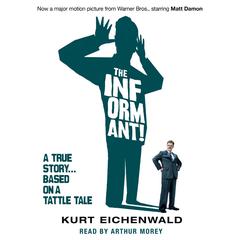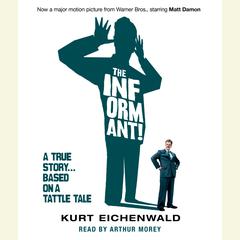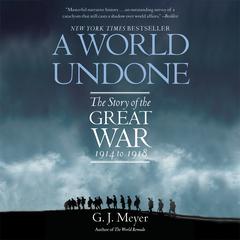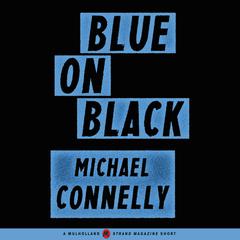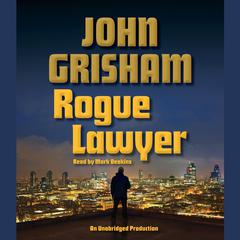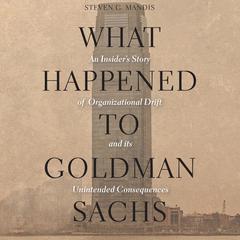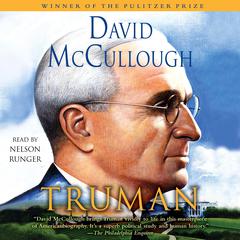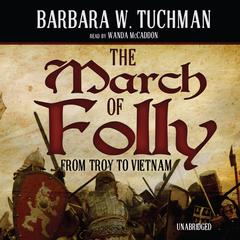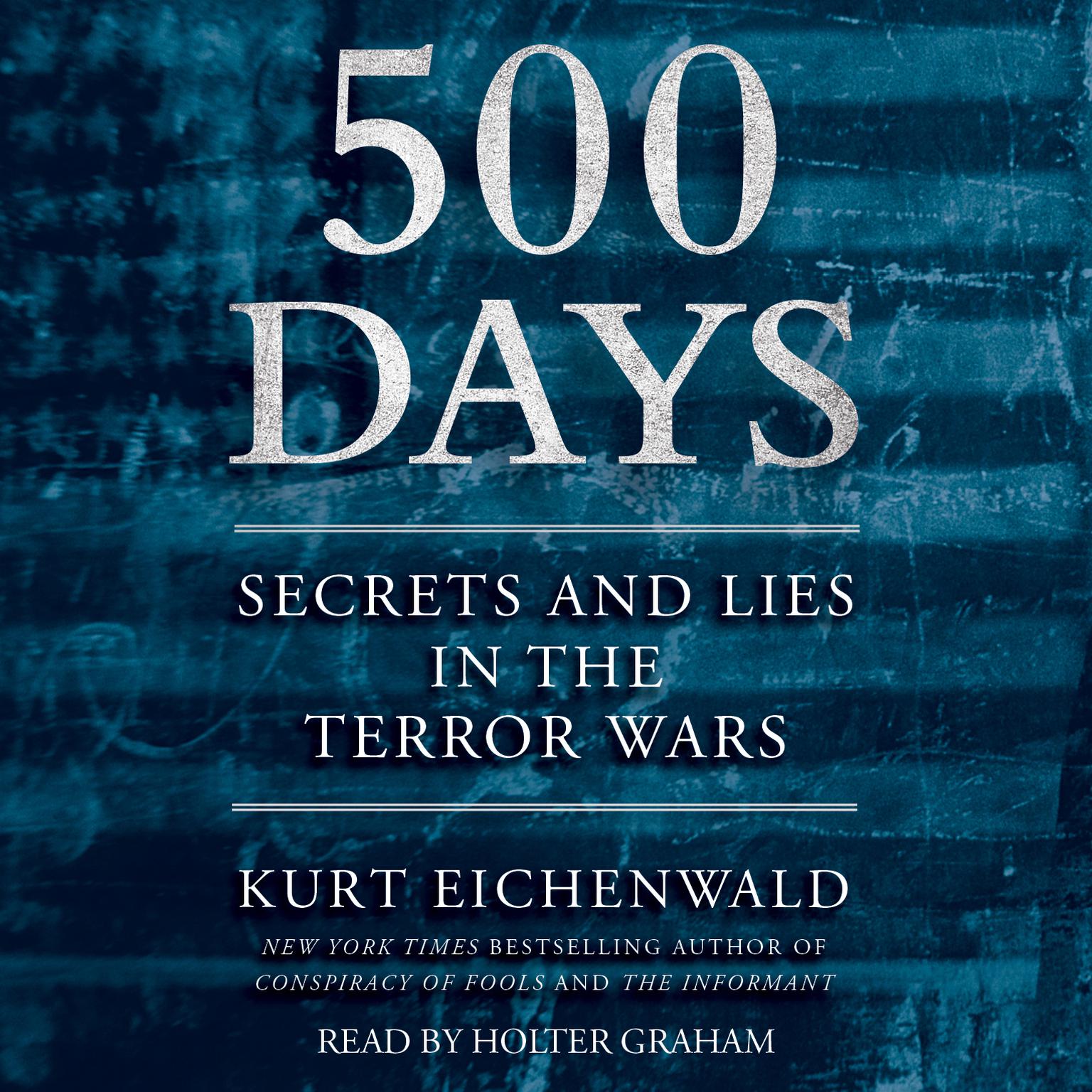 Play Audiobook Sample
Play Audiobook Sample
500 Days: Secrets and Lies in the Terror Wars Audiobook
 Play Audiobook Sample
Play Audiobook Sample
Quick Stats About this Audiobook
Total Audiobook Chapters:
Longest Chapter Length:
Shortest Chapter Length:
Average Chapter Length:
Audiobooks by this Author:
Publisher Description
Kurt Eichenwald—New York Times bestselling author of Conspiracy of Fools and The Informant—recounts the first 500 days after 9/11 in a comprehensive, fly on the wall, compelling page-turner as gripping as any thriller.
In 500 Days, master chronicler Kurt Eichenwald lays bare the harrowing decisions, deceptions, and delusions of the eighteen months that changed the world forever, as leaders raced to protect their citizens in the wake of 9/11.
Eichenwald's gripping, immediate style and true-to-life dialogue puts readers at the heart of these historic events, from the Oval Office to Number 10 Downing Street, from Guantanamo Bay to the depths of CIA headquarters, from the al Qaeda training camps to the torture chambers of Egypt and Syria. He reveals previously undisclosed information from the terror wars, including never-before-reported details about warrantless wiretapping, the anthrax attacks, and investigations and conflicts among Washington, DC, and London.
With his signature fast-paced narrative style, Eichenwald—whose book The Informant was called "one of the best nonfiction books of the decade" by the New York Times Book Review—exposes a world of secrets and lies that has remained hidden until now.
Download and start listening now!
"The title made me think this would be just another political rant, but this book is admirably balanced and never gets polemic. Eichenwald shows how the Bush administration struggled to find a proper balance between national security and legal rights. While it is all too easy to portray the Bush team as evil dictators hellbent on breaking laws, it is important to consider the context of the time period. After 9/11 NOBODY wanted to see another such terrorist attack happen without having done something about it. All this talk of conspiracies and curbing of civil liberties has nothing to do with some evil conspiracy. Rather, it has everything to do with preventing another catastrophe like 9/11 from happening again. We as citizens can, and should, debate whether these methods' benefits outweighed their drawbacks. But portraying it as some evil conspiracy completely misses the point. In an ideal, perfect world, the Bush team would never have considered the things they considered after 9/11. But after 9/11, it was a different world, and the Bush team, or anyone in their position, for that matter, did what they felt was necessary. If the typical pundit who criticizes the Bush team's decisions was in their place during and after 9/11, I find it hard to imagine how THEY would have steered policy into some sort of perfect, rosy, fantasyland where there is no human cost,no paranoia, no hard decisions and an abundance of perfect solutions.Eichenwald's book moves along at a crisp, smooth pace and never bogs down. However, a big limitation of the fast-paced style is that it precludes analysis and insights into why something happened. For example, an extended analysis of the misconceptions about the "Manchester Manual" is consigned to the "Notes and Sources" appendix (pp 545-552). Advice: Read it -- it is a critical part of the story. One of my biggest frustrations with the accounts -- this and others -- is that I haven't seen a remotely satisfying explanation of why the CIA didn't have qualified, experienced interrogators as part of its normal course-of-business. Or why the military did not use experienced interrogators from the Reserves -- predominantly from civilian law enforcement -- despite the Reserves being explicitly structured to preserve and provide that capability.There are several themes that are developed in 500 Days. One of the most important themes is how United States conducted the War on Terror. The War on Terror was multifaceted. It involves the military, the CIA, the FBI, the Justice Department, the State Department, the border patrol and the Department of the Treasury just to name a few of the departments that were involved. This book discusses the decisions that were made in the immediate aftermath of 9/11 in order to try to prevent a second attack. George Tenet, director of central intelligence, was convinced the 9/11 was the first in a series of attacks. The FBI and the CIA were convinced that there were sleeper cells here in the United States and abroad. These cells were ready to act. Because of this, the Bush administration always felt like they were behind the eight ball. The Bush administration felt that they needed to catch up in order to prevent the next attack.One of the sub themes in 500 Days was what to do with detainees and how to interrogate detainees. An outsider, like me or you, would probably figure that there was a big meeting in the White House with the president, vice president and other principles sitting around then discussing how to take care of detainees and how to interrogate detainees, that never happened. Instead, a series of lower-level meetings occurred on the fly. The complexity of this issue is well demonstrated in this book. The central role of John Yoo, Alberto Gonzales, Dr. Jim Mitchell, psychologist for the SERE program, David Addington and William "Jim" Haynes is painstakingly described. The amount of detail on who did what, in my mind, is unprecedented. And enhanced interrogation techniques were not "illegal." They were approved all the way up the line at the Justice Department. The problem was no their legality but their ineffectiveness. FBI rapport-building techniques had been successful time and time again. Harsh tactics simply caused weaker detainees to fabricate lies in order to get the torture to stop and tougher detainees (who came from countries that employed torture on a regular basis) to harden up. As if this isn't stupid enough, when Abu Zubaydah was waterboarded, he had already spilled the beans on what he knew. Before he was waterboarded. How odd.One of the simplistic arguments that has been perpetuated in the mainstream media was the decision to torture or not torture a particular detainee. The mainstream media has told us that "no actionable intelligence" has come from torturing detainees. Kurt Eichenwald was thrown a wrench in this simplistic view of the world. He has shown us that Khalid Sheikh Mohammed who was tortured under US custody gave us a ton of actionable intelligence. (Al Qaeda in Southeast Asia was almost completely wrapped up, disabled, because of the information that came from KSM.) On the other hand, Abu Zubaydah who was initially interviewed by the FBI, gave them excellent intelligence before he was subjected to harsh interrogation (torture). The issue is not black or white. The problem is extremely complex. I tip my hat to Kurt Eichenwald for letting us see that these decisions aren't so black and white.The most glaring error is stating that each plane had four hijackers, except United 93, which had three. Since there were 19 hijackers the math doesn't add up. Of course there were five on the three; four on United 93 to get to 19.Other than that,a great read."
— Jerome (5 out of 5 stars)
Quotes
-
“Illuminating and entertaining throughout.”
— Parade -
“[500 Days is] best and most informative when depicting how the Bush administration, and especially its lawyers, suffered a protracted nervous breakdown during that time. In that respect, it is an ambitious undertaking and a valuable resource.”
— New York Times Book Review -
“An epic narrative….It may be his best book yet.”
— Vanity Fair -
“Eichenwald is a master at making complicated stories easily understood…[500 Days is] a page-turner because of his journalistic attention to detail. Readers get fly-on-the-wall accounts as Bush administration officials weigh life-and-death decisions.”
— Washington Post -
“Thorough reporting and crisp writing…[it] moves at the pace of a movie-ready thriller.”
— Dallas Morning News -
“Both a page-turning read and an insightful dissection of 9/11’s dark legacy.”
— Publishers Weekly (starred review) -
“With the pacing of a suspense novel, award-winning journalist Eichenwald’s richly researched account…[is] a breathtaking inspection of the war on terror that began on 9/11 and reverberates to this day.”
— Booklist (starred review) -
“A blow-by-blow, episodic reconstruction of the fallout from 9/11 in the highest spheres of terrorist strategy…demonstrating literally how the anti-terrorist hysteria in the United States and the hatred of America and general global paranoia, forged the trauma that haunts the world to this day.”
— Kirkus Reviews
Awards
-
A New York Times bestseller
-
An Amazon Top 100 Book of 2012
-
A 2012 Washington Post Notable Book for Nonfiction
500 Days Listener Reviews
-
" OK history book with commentary. Nothing new in this book, it seems all this is a part of public record. "
— Gspesh, 2/14/2014 -
" A well written, fast moving and detailed history of the 500 days immediately following the events of 9/11. Kurt Eichenwald traveled the globe doing exhaustive reporting and interviews with hundreds of individuals who were part of the global events during this time. His narrative is gripping as he outlines the decision making and reasoning behind the U.S. response to the events of 9/11 leading up to the start of the war in Iraq. Fascinating history and well worth the time. "
— Tony, 2/12/2014 -
" This will make you mad at Bush and friends, all over again. "
— Don, 1/31/2014 -
" This book was a very interesting approach to the question of the balance between security and liberty in post 9/11 America. While much emphasis was placed on Mr. Yoo and his opinions while in the Office of Legal Counsel, I would like to have seen some more ideas on how the law - and international treaties - could and should be changed to adapt to a world where terrorism can be stateless and conflicts can last for many years. "
— Stan, 1/28/2014 -
" Like just about every book covering the "War on Terror", this book shocked and surprised me with how terrible the Bush administration was at its job. I wish I could believe that we'll have the sense not to elect anyone like him for the next century. "
— Matthew, 1/25/2014 -
" the only reason this is not getting 5 stars is because i wanted more of it. "
— Jenny, 1/19/2014 -
" Excellent piece of reporting on the security apparatus the government created after 9/11 "
— Zach, 1/13/2014 -
" Best book I've read on ages. Propulsive narrative and very balanced. Lived it "
— Tom, 12/27/2013 -
" Nuggets of truth surrounded by sensationalism. Take this book with a grain of salt. "
— Henry, 10/21/2013 -
" Truly fascinating book. Well written and well researched. "
— Hollie, 10/11/2013 -
" Interesting perspective on how the Administration handled and made decisions regarding strategies, legal issues, and war aspects in fighting terrorism. Amazing detail. Little too much narrative on the torture aspects of interrogation and what is legal and not legal. "
— Bill, 9/7/2013 -
" Wow - great book. This non-fiction book read like a fast-paced thriller. I would highly recommend it! I also feel that it was very, very well researched and documented. Parts of this are very scary and most of the book will make you think about what it means to be part of a democracy. "
— Dennis, 9/4/2013 -
" If you want to know why the Constitution is important and how easily the Bush administration ignored it, this is a must read. If you never think about the importance of protecting your rights, it is a double must read. "
— Brett, 7/29/2013 -
" All i can say is amazing--completely amazing. "
— Max, 5/29/2013 -
" Very easy to understand. I find these types of books are often written with a difficult lingo to understand. Not this one "
— Angie, 3/27/2013 -
" Very well researched, great inside conversations, a bit heavy on the legal issues. "
— Mark, 3/1/2013 -
" Overall a fair evaluation of the events and personalities involved in the aftermath of 9/11 and the evolution of the programs and policies related to intelligence gathering. Definitely worthwhile as a perspective on the political conflict in this era "
— Johnbh46, 12/30/2012 -
" Good stuff, though I didn't learn much that I didn't already know or had guessed at. But if you have an interest in America's Iraq misadventure during GWB's administration, this book gives a great overview and lets the facts speak for themselves. The writing style is great too. "
— Nate, 11/29/2012 -
" Interesting first 200 pages. But author is only interested in Guantanamo and the Bush administration's suspension of habeus corpus. Not enough to continue, so i skipped to the end "
— Davehbo, 11/5/2012
About Kurt Eichenwald
Kurt Eichenwald is a senior writer with Newsweek, a contributing editor with Vanity Fair, and the author of three New York Times bestselling books. He wrote for the New York Times for more than twenty years. A two-time winner of the George Polk Award for excellence in journalism, he was a finalist for the Pulitzer Prize in 2000 and 2002. His New York Times bestseller The Informant was made into a major motion picture starring Matt Damon.
About Holter Graham
Holter Graham, winner of three of AudioFile magazine’s Best Voice of the Year awards, is a stage, television, and screen actor. He has recorded numerous audiobooks and earned multiple AudioFile Earphones Awards. As an actor, his film credits include Fly Away Home, Maximum Overdrive, Hairspray, and The Diversion, a short film which he acted in and produced. On television, he has appeared in Army Wives, Damages, As the World Turns, Rescue Me, Law & Order, and New York Undercover. He received a BA degree from Skidmore College and an MFA from Vermont College.






